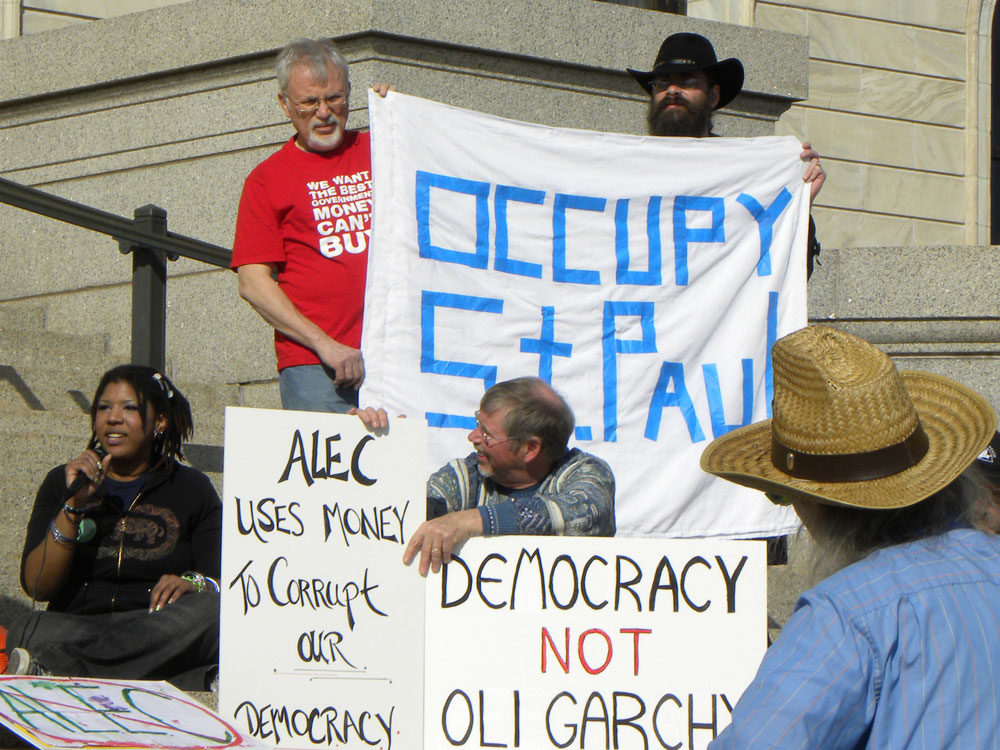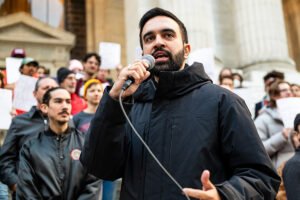
December 4, 2019; Truthout
Last week, the American Legislative Exchange Committee (ALEC) convened in Scottsdale, Arizona, for its 2019 State and Nation Policy Summit. For more than four decades, ALEC, a 501c3 nonprofit organization, has brought together state legislators and corporate representatives in private to craft model legislation that will advance their shared belief in limited government and conservative value politics.
As the group’s meeting was beginning, a coalition of public interest groups challenged the group’s bona fides when they accused the organization of being, as described by Truthout, “an incubator for efforts to protect white supremacy.”
ALEC describes itself as “America’s largest nonpartisan, voluntary membership organization of state legislators dedicated to the principles of limited government, free markets and federalism.” It sees its role as benignly providing a forum where state legislators can learn about important issues of the day from various experts. It shields the details of these conversations, and the way it fashions its model legislation, from public scrutiny and protects its participants from public accountability.
Its critics have long challenged its secretive culture and condemned it for fostering the destructive influence of well-funded special interests.
The recently published ALEC Attacks, a report commissioned by the Center for Constitutional Rights, Dream Defenders, Palestine Legal, The Red Nation, and the US Campaign for Palestinian Rights, takes those criticisms to a new level. The report describes ALEC as emerging from the backlash to the breakdown of segregation and finds that it continues to support efforts that disproportionally impact people of color and other disenfranchised communities. As Rachel Gilmer, co-executive director of Dream Defenders, a Florida-based racial justice organization, says in a statement, “The story of ALEC is the story of a white supremacist political and economic elite harnessing their control of the means of government to perpetuate their own power.”
ALEC’s founder, political activist Paul Weyrich, capitalized on the powerful emotions released as federal and state officials moved to realize the dream of Brown v. Board of Education. “Restrictions on segregated education marked a critical change in his community; his evangelical peers were finally as eager as he was to fight back against social progress.”
Sign up for our free newsletters
Subscribe to NPQ's newsletters to have our top stories delivered directly to your inbox.
By signing up, you agree to our privacy policy and terms of use, and to receive messages from NPQ and our partners.
When, according to the new report, that energy proved unable to sustain a financially stable organization, ALEC saw the need to make a strategic shift and capitalized on the growing concern in corporate America about government regulations. “ALEC must begin to function more like a business and recognize that it has a product that it provides to a defined customer base for a ‘profit.’ In other words, there can be no mission without margin. ALEC’s product is policy, and its customers are state legislators and private sector supporters.”
The new framework provides financial stability and allows ALEC to continue its support of white privilege. The agenda expanded to include issues like regulation reform and lower taxes. Its effectiveness can be seen both in the specific legislation it supports and in its unique ability “to change the terms of the debate itself. By lending its political platform to the reactionary forces behind bills seeking to vilify an entire movement for human rights and re-define ‘antisemitism’ to serve its own political ends”
Ensuring the right to vote for all Americans was a critical focus as the nation worked to tear down remaining barriers in the 1960s and ’70s. As with school desegregation, these efforts drew a backlash, and ALEC became a key force in rolling back the tide of progress. Efforts led by ALEC’s legislative members led to the passage of the voter suppression legislation now in force in more than 30 states. ALEC seized upon the made-up fear of voter fraud to power its legislative agenda forward in a manner that disproportionately impacted communities of color. A bill stewarded through North Carolina by four ALEC members was found by a US Appeals Court to be blatantly biased because “the enacted legislation restricting all—and only—practices disproportionately used by African Americans.”
In a similar fashion, ALEC, according to this study’s’ findings, has crafted its positions relating to climate change, the BDS movement, and “stand your ground” legislation with the same skewed perspective, all issues which disproportionally affect communities of color.
ALEC has used its nonprofit status to shield its activities from the public. In 2013, as reported by NPQ, US Senator Richard Durbin tried to get ALEC members and supporters to tell the public of their engagement with the organization when he “sent a letter to some 300 organizations he [believed] to be financial supporters” of ALEC. His effort proved unsuccessful. A recently filed lawsuit in Arizona, according to the Phoenix New Times, challenged ALEC’s “secretive, closed-door legislative planning sessions aimed at producing legislation that will impact all Arizonans” that “subvert[s] the long-established right of the public to observe the legislative process and understand what interests are influencing it.”
Dominic Renfrey, the advocacy program manager at the Center for Constitutional Rights, said in a statement noted by Truthout that “far from being content with 46 years of circumventing democracy by providing pay-to-play private access to lawmakers for its corporate and conservative members, ALEC is still brazenly attacking the movements that dare to advance human rights and protect the environment.”
That they are doing this is disturbing. That they do this under the guise of a 501c3 organization, one that claims that status because it is operating in the public’s interest, is even more so.—Martin Levine











